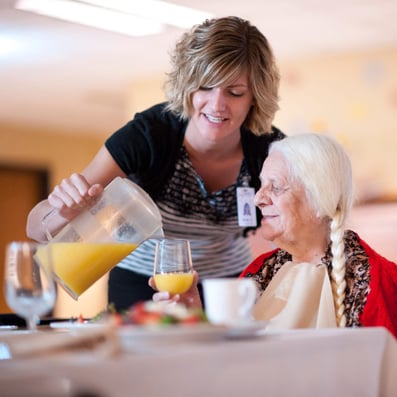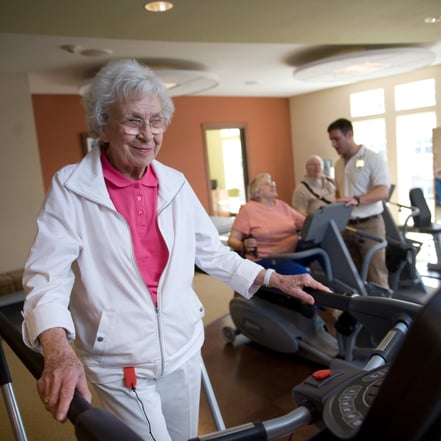What to Consider When Choosing Assisted Living for Parkinson’s
When it comes to picking a senior living community for someone with Parkinson’s disease, there’s a lot to think about. This decision often involves more than care, as it is equally important that people with Parkinson’s continue to live their lives with dignity and purpose.
If you’re looking for an assisted living community that can help you or a loved one manage Parkinson’s disease, start by searching for these areas of focus.
Look for a Parkinson’s program
The best option for someone living with Parkinson’s is to find a program that centers around helping people live healthy, active lives through Parkinson’s-focused care.
A robust program will include:
- Additional time for residents with Parkinson’s to complete their daily routine
- Staff who have an understanding of how Parkinson’s impacts the body (including how it progresses)
- A focus on providing a high quality of life through mental, physical, and social activity
- A system that is well-followed and ensures that medications are given to residents on time
- Support groups for caregivers
Review safety features and precautions
Parkinson’s impacts the vital nerve cells within the brain, often leading to mobility and balance issues. As a result, there are additional safety features to consider when choosing an assisted living community.
While most communities will offer basic safety features, such as handrails in the bathrooms and hallways, it’s important to also consider additional measures:
- Wheelchair accessibility, even if you or your loved one does not currently use a wheelchair
- Assistive technology
- Wearable devices that can call for help if someone falls in their apartment
- Non-skid flooring surfaces
- Raised bed and toilet height options
- Easy access to windows and the outdoors
Confirm that teams receive ongoing Parkinson’s education

As Parkinson’s progresses, a resident might require services or care from a wide range of teams to remain active and healthy. Medical professionals whose services might be needed include the following:
- Neurologist
- Physical therapist
- Speech and/or occupational therapist
- Mental health specialist
- Other care providers
It’s important for anyone working with a Parkinson’s resident to have the most updated training — especially because Parkinson’s presents itself differently in every person who is diagnosed. Make sure you ask how team members stay up-to-date on the latest care standards for their Parkinson’s residents.
Stop by the fitness center

Parkinson’s therapy and rehabilitation is critical for maintaining balance and staying mobile in day-to-day life. And a wide range of exercise options, from strength training and aerobic activity to balance and flexibility, can help someone with Parkinson’s manage the physical side-effects of the disease and remain more independent.
When searching for an assisted living community, ask about their fitness program options (and if there are programs available for those with low or inhibited mobility). This will give you a good sense for how the community can continue to help through the progression of Parkinson’s. It’s also important to ask how team members customize sessions based on each person’s individual needs.
When is it time to move someone with Parkinson’s to assisted living?
It can be difficult to know when it’s the right time to move someone with Parkinson’s into assisted living. To ensure everyone is on the same page, and to ensure a smooth transition, you might consider having a family meeting (and including a neutral professional such as a social worker or care manager).
It might be time to have this conversation if you or your loved one:
- Requires round-the-clock care and/or does not have access to adequate in-home care
- Does not have the proper safety features in place in their current home (e.g., one-level living, bathroom accommodations, handrails, or ramps to enter the home)
- Has experienced a serious disease-related injury
- Is struggling to take meds on time or cannot perform other daily activities, including bathing and eating
Get the Parkinson’s support you need at Walker Methodist
At Walker Methodist, we partner with Struthers Parkinson’s Center to offer a comprehensive Parkinson’s program. From specialized low-protein diets and specialized stretching exercises to music therapy to help stimulate dopamine and serotonin production in the brain, our communities are well-equipped to support high-quality, healthy lives for residents.
Ready to see one of our Parkinson’s care communities for yourself? Schedule a visit.
Today, I bring you a guest post from a couple of nomadic retirees, Tom Swan and Georganna Hawley. They’ve…
Copyright © 2024 Retiring & Happy. All rights reserved.









